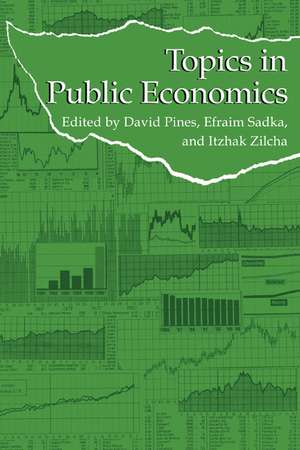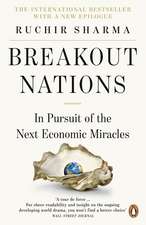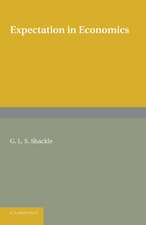Topics in Public Economics: Theoretical and Applied Analysis
Editat de David Pines, Efraim Sadka, Itzhak Zilchaen Limba Engleză Paperback – 23 iun 2010
| Toate formatele și edițiile | Preț | Express |
|---|---|---|
| Paperback (1) | 354.41 lei 6-8 săpt. | |
| Cambridge University Press – 23 iun 2010 | 354.41 lei 6-8 săpt. | |
| Hardback (1) | 782.83 lei 6-8 săpt. | |
| Cambridge University Press – 27 noi 1997 | 782.83 lei 6-8 săpt. |
Preț: 354.41 lei
Nou
Puncte Express: 532
Preț estimativ în valută:
67.82€ • 73.90$ • 57.15£
67.82€ • 73.90$ • 57.15£
Carte tipărită la comandă
Livrare economică 23 aprilie-07 mai
Preluare comenzi: 021 569.72.76
Specificații
ISBN-13: 9780521144865
ISBN-10: 0521144868
Pagini: 372
Dimensiuni: 152 x 229 x 21 mm
Greutate: 0.54 kg
Editura: Cambridge University Press
Colecția Cambridge University Press
Locul publicării:New York, United States
ISBN-10: 0521144868
Pagini: 372
Dimensiuni: 152 x 229 x 21 mm
Greutate: 0.54 kg
Editura: Cambridge University Press
Colecția Cambridge University Press
Locul publicării:New York, United States
Cuprins
Foreword Haim Ben-Shahar; Introduction Efraim Sadka, David Pines and Itzhak Zilcha; Part I. New Perspectives on Urban Development: 1. A 'slime mold' model of city formation Paul A. Krugman; 2. The size of regions: transport and housing as factors in agglomeration Elhanan Helpman; Part II. The Economics of Clubs: 3. First and second welfare theorems for economies with collective goods Vicky Barham and Myrna H. Wooders; 4. Anonymous pricing in Tiebout economies and economics with clubs John Conley and Myrna H. Wooders; 5. Decentralization in club economies: how multiple private goods matter Robert P. Gilles and Suzanne A. Scotchmer; 6. Incentives and disagglomerative forces: some modelling problems Roger Guesnerie; Part III. The Provision of Public Goods: 7. Self-financing of congestible facilities in a growing economy Richard Arnott and Marvin Kraus; 8. The monopolistic provision of congested public goods William H. Oakland; 9. Imperfect solutions to the musical-suburbs problem John D. Wilson; 10. Nationalism and secession Daniel Berkowitz; Part IV. Taxation and Distribution: 11. Why is there corporate taxation in a small open economy? The role of transfer pricing and income shifting Roger H. Gordon and Jeffrey K. MacKie-Mason; 12. Patterns of tax arbitrage and decentralized tax autonomy Bernd Genser; 13. Destination- and origin-based taxation under international capital mobility A. Lans Bovenberg; 14. Factor mobility, risk, and redistribution in the welfare state David E. Wildasin.
Recenzii
Review of the hardback: 'This fine collection of essays, most of them dealing with issues of local public goods and clubs, should be the main selection of the public-economics-Book of the Month Club.' Avinash K. Dixit, Princeton University
Review of the hardback: 'This book is a fitting tribute to the memory of Eitan Berglas … a diverse and highly original set of papers spanning the many areas where issues of decentralization and integration must be appropriately balanced, a task that draws heavily on Berglas's legacy'. Robin Boadway, Queens University
Review of the hardback: 'This book is a fitting tribute to the memory of Eitan Berglas … a diverse and highly original set of papers spanning the many areas where issues of decentralization and integration must be appropriately balanced, a task that draws heavily on Berglas's legacy'. Robin Boadway, Queens University
Descriere
This volume presents developments in urban geography, club theory, local public finance, and international trade which contribute to the explanation of the modern opposing trends.
















